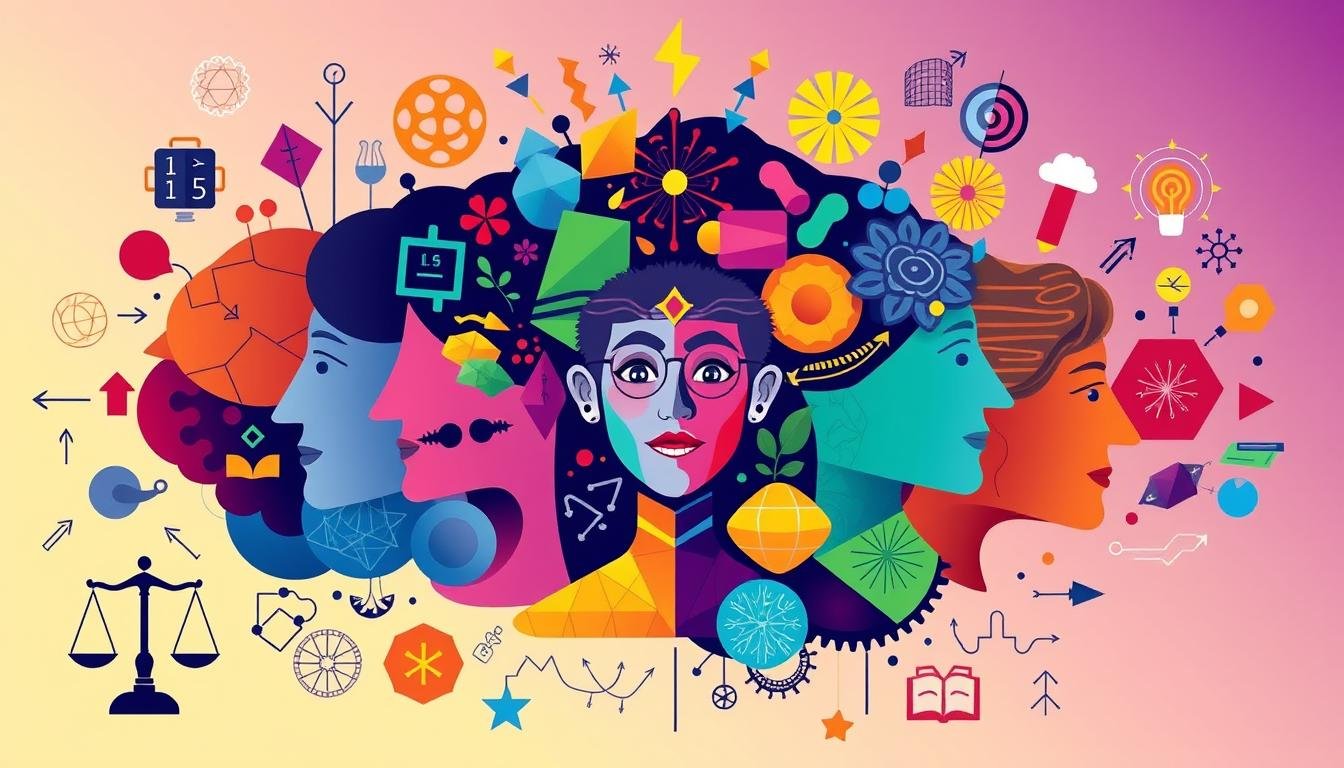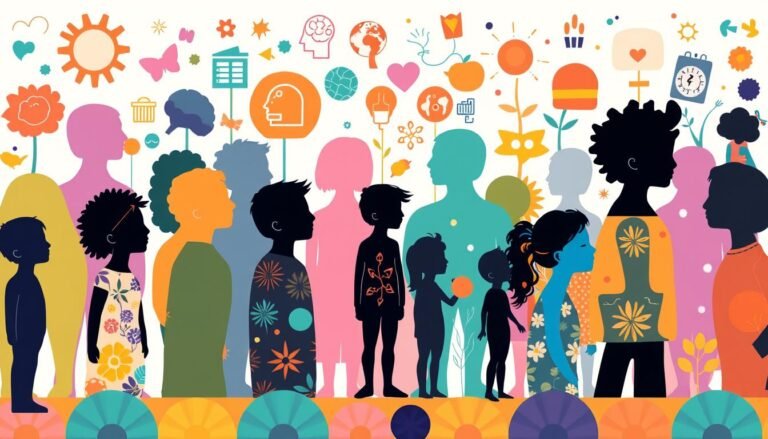Personality and Decision-Making: Your Choices Revealed
Imagine you’re in front of your closet, trying to pick an outfit for a job interview. You might not notice, but your personality is guiding your choice. This simple choice shows how our personality and decision-making styles shape our lives.
Recent studies have shown how our personality affects our decisions. A study with 296 general medicine students found a link between personality and decision-making. It showed that extroverts tend to make less rational choices.
But, agreeable and conscientious people are more likely to make rational choices. This gives us a peek into how cognitive biases influence our decisions.
The study also found that emotional intelligence is key. It helps connect personality traits with decision-making styles. This shows the importance of knowing our emotional side when making choices.
Key Takeaways
- Personality traits significantly influence decision-making styles
- Higher extroversion is linked to less rational decision-making
- Agreeableness and conscientiousness are associated with more rational choices
- Emotional intelligence mediates the relationship between personality and decision-making
- Understanding our traits can help us make more informed decisions
Understanding the Connection Between Personality and Choices
Our personality influences how we decide things. Research shows that different traits lead to different ways of making choices. Let’s look at how the Five-Factor model and emotional intelligence affect our decisions.
The Five-Factor Model of Personality
The Five-Factor model is a key part of trait theories. It includes traits like extroversion, openness, agreeableness, conscientiousness, and neuroticism. A study of 5,830 older adults found interesting links between these traits and decision-making:
- High conscientiousness and openness led to more active decision-making
- Low agreeableness and neuroticism also favored active choices
- Conscientiousness predicted longevity and better health behaviors
- Neuroticism influenced patient illness behavior, sometimes leading to treatment avoidance
How Personality Traits Influence Decision-Making Styles
Different personality traits lead to unique decision-making approaches:
| Personality Trait | Decision-Making Style |
|---|---|
| Openness to Experience | Risk-taking |
| Neuroticism | Poor performance under pressure |
| Extraversion | Overconfident but cooperative |
The Role of Emotional Intelligence
Emotional intelligence is key in decision-making. It helps us understand and manage our emotions, show empathy, and adapt to situations. Studies show that 50% of human decisions are driven by emotions, showing emotional intelligence’s importance.
Understanding how personality traits, emotional intelligence, and decision-making interact can help us make better choices. This is true in healthcare and business.
The Science Behind Decision-Making Processes
Neuropsychology gives us a peek into how our brains decide things. It shows that making choices is a complex process. Many factors shape our decisions.
Research on cognitive biases reveals our choices aren’t always logical. For example, older adults often look for the good in things. This “positivity effect” makes them quicker to notice positive stuff.
Heuristics, or mental shortcuts, are key in our decision-making. They help us deal with tough situations fast. But, they can sometimes cause us to make mistakes.
“Decision acuity,” a common factor identified in recent research, appears distinct from IQ and relates to neural networks in the brain. This finding suggests that decision-making ability is a unique cognitive skill.
Our environment also affects our choices. Studies link more complex environments to better thinking. This shows how different experiences shape our decision-making skills.
| Factor | Impact on Decision-Making |
|---|---|
| Age | Increased focus on positive information |
| Environmental Complexity | Higher cognitive function |
| Decision Fatigue | Decline in decision-making skills |
| Information Overload | Impeded rational decision-making |
Knowing these scientific facts can help us make smarter choices. It helps us understand what influences our decisions.
Exploring Different Decision-Making Styles
Decision-making styles are key in how we make choices. There are four main styles: Analytical, Directive, Conceptual, and Behavioral. Each style affects how we process information and decide.
Analytical Decision-Making
Analytical decision-makers are great at making responsible choices. But, they might take longer to decide. They look at all the facts, opinions, and outcomes before making a choice. This style is best for complex situations that need a lot of analysis.
Directive Decision-Making
Directive decision-makers like making quick decisions and following rules. They use past experiences to guide their choices. This style is good for quick or routine decisions but might seem too bossy.
Conceptual Decision-Making
Conceptual thinkers do well in unclear situations and find creative solutions. They are great at solving complex, unclear problems. However, they might not be the best for simple decisions.
Behavioral Decision-Making
Behavioral decision-makers focus on keeping harmony and considering relationships. They value input and consensus, taking into account team feelings. This style is best for decisions that impact many people.
Knowing your decision-making style can help you make better choices and feel more confident. Managers should learn to use different styles for different situations. Tools like Myers-Briggs Type Indicator can help figure out your style. But, be careful in the workplace because of legal issues.
| Decision Style | Key Characteristics | Best Used For |
|---|---|---|
| Analytical | Thorough, responsible | Complex situations |
| Directive | Quick, structured | Recurring decisions |
| Conceptual | Creative, innovative | Ambiguous problems |
| Behavioral | Collaborative, people-focused | Team-affecting choices |
Personality Traits and Their Impact on Choices
Personality greatly influences our choices. Research shows that genetics play a big role in our personality traits. This genetic influence shapes how we make decisions.
Studies indicate that personality traits can explain up to 28.1% of how we decide things. Let’s look at how certain traits affect our choices:
- Agreeable people like to work together and do well in group decisions.
- Those who are not agreeable tend to focus on their own interests, sometimes ignoring others’ feelings.
- Highly neurotic individuals worry a lot and tend to avoid risks.
- Extraverts feel good when making decisions but might be too confident.
- Conscientious people do well because they plan and keep going.
The Enneagram framework divides personalities into three main types: head, heart, and gut. Each type has its own way of making decisions in teams:
| Center | Decision-Making Tendency |
|---|---|
| Gut | Want to control everything, often seen as “control freaks” |
| Heart | Make choices based on how others see them |
| Head | Think about the future and aim for the best outcomes |
Knowing these personality differences is key for good team decisions. It helps unlock each person’s full potential in different situations.
The Role of Emotional Intelligence in Decision-Making
Emotional intelligence is key in making choices. A study with 296 general medicine students showed how it affects our decisions. It found that emotional intelligence shapes our decision-making approach.
Recognizing and Managing Emotions
Being self-aware and self-regulated is crucial. Leaders who excel in these areas stay calm and make thoughtful decisions. This is important, as 60% of CEOs face at least one crisis during their time in office.
Empathy and Social Awareness
Empathy helps leaders understand the impact of their choices on others. Companies that value empathy see lower employee turnover. Good social skills lead to better communication and teamwork, making decisions easier.
Adapting to Different Situations
The study showed emotional intelligence links personality traits to decision-making styles. It improves intuitive decisions and reduces avoidant and dependent ones. This adaptability is key, as emotional intelligence is linked to 58% of job success across industries.
Understanding emotional intelligence in decision-making helps us make better choices. By developing these skills, we can use our emotions to guide our decisions without being controlled by them.
Personality and Decision-Making in the Workplace
Personality traits greatly influence our work choices. Bosses and workers can make better decisions by understanding these traits. Let’s explore how different personalities impact work decisions.
- Openness to Experience: People who enjoy new things and take risks
- Conscientiousness: Planners who think ahead and focus on details
- Extraversion: Social and confident decision-makers
- Agreeableness: People who consider others’ feelings in their choices
- Neuroticism: Those who worry more about their decisions
Knowing your personality can improve your work choices. For instance, if you’re open, you might be great at coming up with new ideas. If you’re conscientious, you might be excellent at planning projects.
Different leadership styles match well with various personalities. A boss who knows their team’s traits can guide them better. This knowledge is also useful when hiring or solving conflicts at work.
| Personality Trait | Decision-Making Style | Workplace Strength |
|---|---|---|
| Openness | Creative | Innovation |
| Conscientiousness | Rational | Planning |
| Extraversion | Quick | Leadership |
| Agreeableness | Collaborative | Teamwork |
| Neuroticism | Cautious | Risk assessment |
By using personality tests, companies can find the right people for jobs and help workers grow. This leads to better teamwork and smarter workplace decisions.
How Stress Affects Personality and Decision-Making
Stress greatly influences our decision-making. When we’re stressed, our usual ways of making choices take over. This can lead to bad choices if we’re not careful.
Reversion to Natural Styles Under Pressure
Research shows stress makes us fall back on old habits. A study of 56 college students found they made riskier choices when stressed. Their heart rates and skin responses were higher too. This shows stress pushes us towards familiar but not always helpful ways of thinking.
Strategies for Maintaining Balance in High-Stress Situations
Good stress management is key to making smart choices. Here are some tips:
- Know your stress triggers
- Practice relaxation techniques
- Take breaks to clear your mind
- Seek support from others
Being aware of cognitive biases can also help. These are mental shortcuts that can lead us astray. By recognizing them, we can make more balanced decisions even when stressed.
Remember, stress affects everyone differently. What works for one person might not work for another. The key is to find what helps you stay calm and think clearly when the pressure’s on.
The Influence of Personality on Consumer Behavior
Consumer psychology helps us see how personality affects what we buy. A study on Medjool dates shows how different personalities choose their products. It gives us interesting insights into what people like based on their personality.
People who are open and a bit neurotic tend to prefer organic and GMO-free products. This matches the trend of health-conscious shoppers looking for natural options. On the other hand, outgoing people like packages with lots of information. This might show their need for interaction and engagement.
Those who are careful and like order prefer products labeled as pesticide-free. This might be because they think about the long-term effects of their choices. These findings show how important it is for businesses to know their customers’ personalities. This way, they can make better products and ads.
It’s also key to understand how personality affects how we see risk. For instance, a study with 326 Chinese consumers looked at how positive traits influence buying smart home devices. Since China is a huge market for smart homes, this information is very useful for businesses aiming at this sector.
Source Links
- Neurocircuitry of Personality Traits and Intent in Decision-Making
- Intrinsic Traits Such as Personality and Decision-Making Style are Predictive of Stress in Surrogate Decision-Makers
- Frontiers | Decision-Making and the Alternative Five Factor Personality Model: Exploring the Role of Personality Traits, Age, Sex and Social Position
- Personality and Health Care Decision-Making Style
- How to make big decisions: A cross-sectional study on the decision making process in life choices – Current Psychology
- A Review of Decision-Making Processes: Weighing the Risks and Benefits of Aging – When I’m 64
- Decision-making
- Decision-making ability, psychopathology, and brain connectivity
- Understanding the 4 Styles of Decision Making (For Your Big Life Decisions) — Creative Foresight
- 4 Types of Decision-Making Styles and How to Utilize Them
- How Your Personality Influences Your Decision Making
- Here’s How Your Personality Type Affects Your Decision Making At Work
- Personality Differences and Investment Decision-Making
- Personality traits, emotional intelligence and decision-making styles in Lebanese universities medical students – BMC Psychology
- EQ and Decision-Making in Leadership – Kingsley Gate
- The Power of Emotions in Decision Making
- The influence of personality on decision-making processes – Noustro
- Work Personality and Decision Making Styles among Working and Non-Working Students
- Why Personality Assessments are Beneficial in the Workplace – HSI
- Stress and Decision Making: Effects on Valuation, Learning, and Risk-taking
- Effects of Acute Stress on Decision Making
- How stress and personality type affect leader’s risk tolerance & decision-making
- The impact of consumer positive personality on the purchase behavior of smart products








